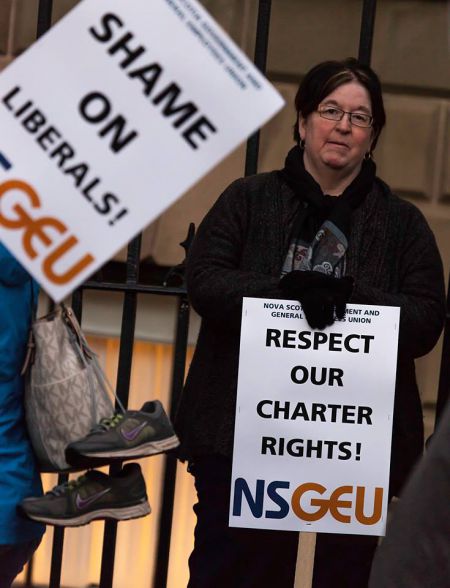Judy Haiven teaches industrial relations at the Sobey School of Business at Saint Mary’s University. She is chair of the Canadian Centre for Policy Alternatives-NS. This is her presentation at Law Amendments; she spoke against Bill 148.
In the last two years, the McNeil government has legislated against homecare workers going on strike and against healthcare workers going on strike.
If that wasn’t enough, now they are threatening to take away the right to bargain wages and signaling they may remove the right to strike of nearly 10,000 teachers, hundreds of medical residents and thousands of civil servants – 75,000 to be exact. Let me put this into perspective. 75,000 working people represent about half the 148,000 families, with children, in Nova Scotia. More than half live in Metro Halifax.
The government tells us that the 75,000 employees can still negotiate but just not the money part. Really. How can that be? Normally if the government removes the right to collectively bargain, it gets replaced by arbitration. But since when does the government tell arbitrators what to do and how to rule? The Supreme Court of Canada has ruled that every employee has the right to join a union, the right to collectively bargain and the right to strike. But our Government seems to know better. How is that?
Let’s review the anti-worker legislation the McNeil government has passed over the last two years. Bill 148, the Public Services Sustainability Act, ensures that a wage framework of 0, 0, 1.0, 1.5, and .5 percent will be imposed on 75,000 teachers and provincial civil servants. The problem is that the province’s economy is forecast to grow and do well in 2016. If the economy improves, inflation will rise. That will wipe out the meager increases the government wants to impose, so public sector workers in NS will earn less!
More than a year ago, Premier McNeil’s government passed essential service legislation which forced home support workers back to work. The Law also stripped 700 nurses from the Victorian Order of Nurses of their right to strike. All told, Bill 37 stripped the right to strike from nearly 40 000 workers in the health sector including nurses, and hospital workers, 911 operators and paramedics. Half the union members in NS were affected by Bill 37.
As we all remember, a year an a half ago, nurses and their supporters went on a wildcat strike the morning after the bill was passed; some people opposed to the bill occupied Kelly Regan’s (Minister of Labour) office, and Leo Glavine’s office. Nurses talked about how understaffing was affecting their ability to provide the level of patient care that was needed. They struck for better working conditions, which means better patient care.
Then the McNeil government passed Bill 100, which could affect every unionized worker in the university sector –more than 10,000 in NS. Bill 100 says that universities who claim to be in financial distress can ask the government for help, which could mean the curtailing of collective bargaining for workers at universities. Already universities such as CBU and King’s have warned of possible layoffs. These two universities could easily file under the terms for a government imposed “revitalization plan. “ Not only could this could limit collective bargaining, it would undermine academic freedom, and remove workers’ rights.
No university has invoked the act yet, but it hangs over us and its effect is to bully workers. Just like the playground bully who just has to walk thru the playground in order that kids ‘freely’ give him their lunch money in order to avoid a fight.
And of course there is cabinet minister Mark Furey who has declared no employees at Nova Scotia’s new Dept of Business will be permitted to join a union – which is simply against the law. Another bullying tactic.
The McNeil government has raised the bar for open and fair collective bargaining. However the bar is barbed wire, covered with glass shards and poison. Sure workers can try to jump over it but everyone knows what’s going on. It’s theoretically possible to clear that bar but it is almost impossible. Bill 148 has evil intent and is meant to intimidate and discourage Nova Scotians.
And one more thing – as a friend of mine put it, if the government wants to save money why don’t they say they can no longer pay for heat, light and power and water for their buildings? The government might want a lower rate but I doubt that NS Power, Heritage Gas or the Water Commission would agree to lower its rates. So the NS government is just picking on the nearest target —the workers.



